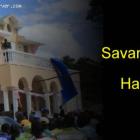ADVERTISEMENT
Dessalines - Haiti Observer Blog
Dessalines, Haiti Observer Blog. Read the following articles about Dessalines
It was in September 1804 that Dessalines proclaimed himself Emperor of Haiti
In 1758, Jean-Jacques Dessalines was born in Central West Africa. He was enslaved in the French colony of Saint-Domingue (Haiti). His biography is a mix of legend and history. However, most historians believe that he was born in Saint-Domingue as Jean-Jacques Duclos, the name of his father was adopted it from his owner. Dessalines started his career as a field hand, rose up to the role of foreman. When he was around age 30, he was sold to a free black man named Dessalines and his surname was changed again. Dessalines served as an officer in the French army when the colony was trying to resist the Spanish and British invaders. In 1791, he joined the slave revolution that broke out in the colony and met the rising military commander Toussaint Bréda (later known as Toussaint L'Ouverture). Gradually, in the decade that followed, Dessalines established himself as a lieutenant of the black leader Toussaint L'Ouverture, who became the governor-general of Saint-Domingue with French support as a reward for his loyalty to France.
Happy Haiti Independence Day, this Pumpkin soup (Soup Joumou) is for you
As a reminder, Independence day in Haiti is an important holiday. we are fortunate to celebrate two important events on this day: On January 1, Haitians all over the world celebrate both New Year's Day and Independence Day.
This little nation made history on January 1, 1804 by becoming the first Black Country to gain its independence. At the same time we change the name of the country back to its original name "Ayiti", name given by the original inhabitants and before Christopher Columbus so called discovered the Island in 1492. At that point the island was named "Hispaniola"
Protest and Manifestation in Haiti
Haiti has historically been besieged by violent upheavals against its governing systems. Securing independence from its status as a slave possession in 1801, ex-slave Toussaint Louverture led the Haitian Revolution, making a conquest of Haiti, and naming himself Governor-General.
Jean-Jacques Dessalines succeeded Louverture in 1804, ruling until his assassination in 1806. Haiti then became a black-dominated northern region and mulatto elite-governed southern region. In 1915, the U.S. began occupying Haiti as a result of another conflict between mulatto elites and blacks. The U.S., concerned about its business interests, stayed until 1934.
When U.S. occupation ended, coup d'etats and provisional presidencies marked the period 1934-1971, until dictator Jean-Claude Duvalier came to office. By 1986, mass uprisings against Duvalier forced him into exile. Henri Namphy, lieutenant general in the Haitian Army, became president after Duvalier's exit.
The Battle Of Vertieres
The battle of Vertieres near Cap-Haitian was motivated by slaves who hat the condition under which they have been living.
Napoleon was confident that slavery would be reestablished in Saint-Domingue. General Rochambeau, who succeeded Leclerc as commander of the French army in Saint-Domingue, started implementing a series of atrocities including mass hangings and drowning of slaves suspected to be involved in insurrections.
Dessalines relentlessly attacks one town after another. He started in the South of the Country with Cayes, then Jacmel, Léogane, Jérémie, Saint Marc and Port-au-Prince. These actually set the stage for the assault on le Cap Français in the last great battle of independence in Vertieres.
The town of Dessalines or as Marchan Dessalines
Dessalines, which is located in the Arrondissement of Dessalines in Haiti's Artibonite department, is known as the world's First Black Capital. It spans 259 square kilometers and is 16 miles from the Caribbean Sea and 51 miles from the capital Port-au-Prince. Around 13,000 people live in Dessalines, with some 280 people residing in every one square kilometer.
Dessalines is also called as Marchan Dessalines. It is named after a revolutionary leader named Jean Jacques Dessalines, who was the first person to lead Haiti after gaining its independence. Jean Dessalines loved the town so much as it became the capital of the First Black Free Country, which was established in 1804. He was a key figure in giving freedom to the black race by opposing slavery and colonialism.
Our objective is to share with you news and information about Haiti and the people of Haiti. Traditions, habits and the way we were or grew are alive in this site. We highly recommend that you Subscribe to our Newsletter and also share with us some of the things that are memorable and made us unique people.


 Haitian Creole Translation
Haitian Creole Translation  Lascahobas, Haiti
Lascahobas, Haiti  Verrettes, Haiti
Verrettes, Haiti  Battle of Vertieres
Battle of Vertieres  The Town of Savanette, Haiti
The Town of Savanette, Haiti